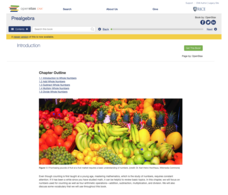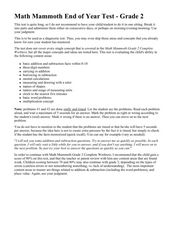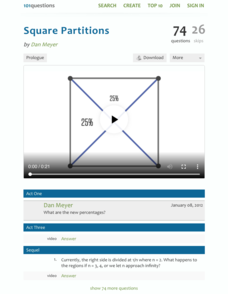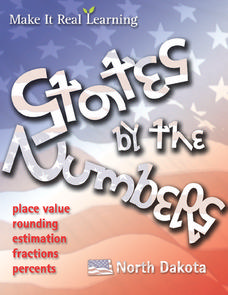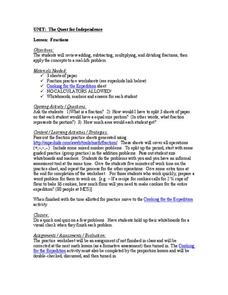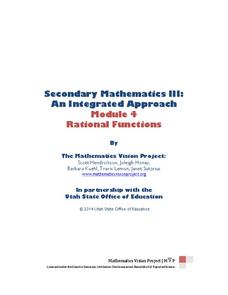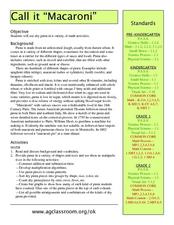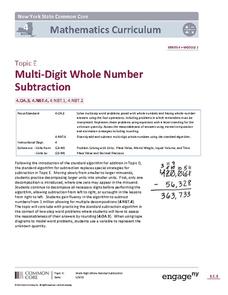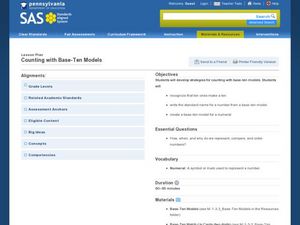Beyond Benign
PPM
The 15th instructional activity in the series of 24 helps your classes understand the ppm (part per million) unit of measure. First, scholars experiment with food coloring to determine concentrations before applying their findings to...
Rice University
Prealgebra
Pre-algebra—all wrapped up in one place. The eBook contains everything needed to teach a typical Pre-Algebra course. Concepts in the course build upon previously learned concepts, allowing mathematicians to see the connections between...
Curated OER
Math Mammoth End of Year Test - Grade 2
Assess your second graders with this end of the year test. Originally meant for home school, this assessment could also be used in a larger setting. Learners complete 35 problems based on their knowledge of the second grade math...
101 Questions
Square Partitions
Challenge your classes while developing their problem-solving skills. A square is divided neatly into four equal triangles by its diagonals until one diagonal is moved from a vertex to the midpoint of one side. Now, scholars must devise...
Curated OER
Funtastic Fractions
Learners discover fractions by creating models. In this fractions lesson, students read Give Me Half! by Stuart J. Murphy and view a video about what fractions actually represent. Learners divide a square piece of paper a certain amount...
Curated OER
Decimals, Fractions and Percentages
In this arithmetic worksheet, 6th graders solve and complete 40 problems. First, they find the value of a number in each decimal listed. Then, students write each list of numbers in order from least to greatest. They also write the...
Curated OER
Using Real-Data from North Dakota to Study Place Value, Rounding, Estimation, Fractions, and Percents
In this real-data worksheet, students use data from the 2008 Census Bureau to answer eight questions divided into four activities. The topics covered include: place value, rounding, estimation, fractions, and percents.
Curated OER
Fractions
Students solve problems with fractions without using a calculator. In this algebra lesson, students practice reducing, converting, adding, subtracting and multiplying fractions. They apply the use of fractions to the real world.
Curated OER
Ways to Extend the Learning With A Fraction Unit
Here are some ideas for extending the learning beyond traditional fraction lessons.
Curated OER
Working with Fractions
For this fractions worksheet, students complete fraction word problems based on recipes that they are given. Students complete 8 problems total.
Curated OER
Fractions and Decimals and Percents; Oh, My!
Fourth graders watch a PBS video about fractions, percents and decimals. They fill in fraction circles and rename them in decimals and percents. They visit and interact on a fractions, decimals and percents website and solve problems.
Curated OER
Everyday Math Experiences
Students can put away the workbooks and experience a real world math day.
Illustrative Mathematics
How Many Servings of Oatmeal?
Here is another way to illustrate division of a whole number by a unit fraction. In this case, the problem is asking if there are so many servings per cup, how many servings are in a package of multiple cups. Learners are to model their...
Mathematics Vision Project
Module 4: Rational Functions
Time to study the most sensible function — rational functions! The seven-lesson unit develops the concept of a rational function through a connection to rational numbers and fractions. Scholars graph functions, solve equations, and...
Curated OER
Measuring Mixed Numbers
Mixed numbers can be added conceptually, algorithmically, and physically. Have the class visualize mixed numbers by adding fraction bars together. They then discover the algorithmic process that simplifies adding mixed numbers. Finally,...
Arizona Department of Education
Area and Perimeter of Regular and Irregular Polygons
Extend young mathematicians' understanding of area with a geometry lesson on trapezoids. Building on their prior knowledge of rectangles and triangles, students learn how to calculate the area of trapezoids and other...
Chicago Botanic Garden
Weather or Not
What is the difference between weather and climate? This is the focus question of a lesson that takes a deeper look at how weather data helps determine climate in a region. Using weather and climate cards, young scholars decide...
Curated OER
Call it "Macaroni"
Who knew there were so many fun educational opportunities featuring pasta? Scholars read a brief informational text about the history of pasta (note that "macaroni" is spelled two different ways, so address this if kids are reading...
Common Core, Inc.
Multi-Digit Whole Number Subtraction
A thorough exploration into subtracting multi-digit numbers, this series of lessons is an excellent way to guide learners of any skill level. With a step-by-step lesson plan and straightforward assessment tools, kids are sure to...
Curated OER
Counting with Base - Ten Models
Help your kids develop strategies for counting. In this base-ten lesson, learners use matching cards, base 10 blocks, and dry erase markers and boards to examine the base 10 counting system.
Consumers Energy
The Cost of Electricity
How much is your toaster costing you every day? Young environmentalists calculate the monetary costs of household appliances based on their average consumption of wattage.
Illustrative Mathematics
Buying Bananas, Assessment Version
Practice with unit rates, proportions, and ratios when Carlos purchases an amount of bananas. Learners must interpret a graph to decide whether points on the same line represent similar proportional relationships. Use with lesson plans...
EngageNY
Solving Percent Problems II
Fill in the blanks to find the best discount! Groups complete a table of amounts and percents associated with sale items. Classmates then find the original cost, sale cost, discount amount, paid percent, or the discount percent...
Curated OER
Egyptian Fractions
Sixth graders take a brief look at what is known about Egyptian Fractions. These are unit fractions - fractions whose numerator is one. We look at how fractions can be represented in terms of Egyptian Fractions. Finally we suggest a web...

